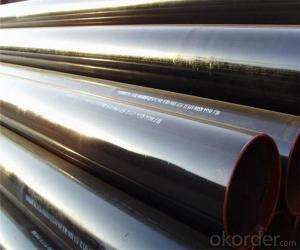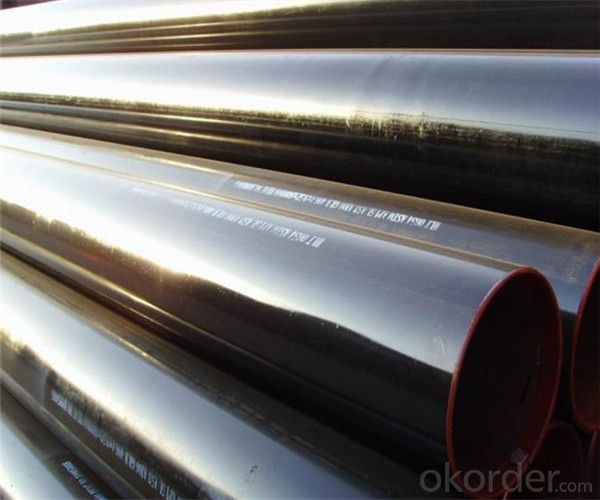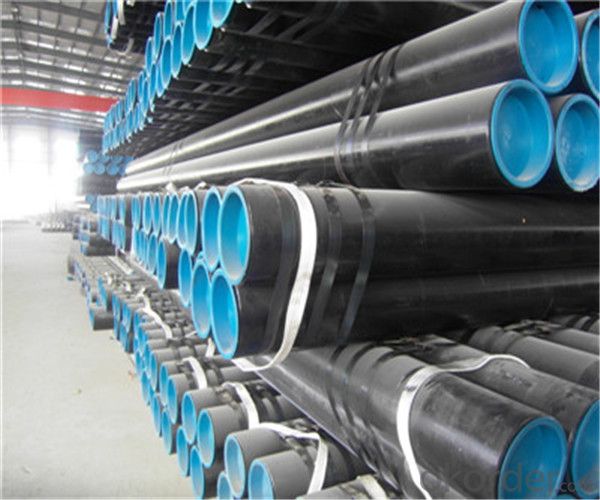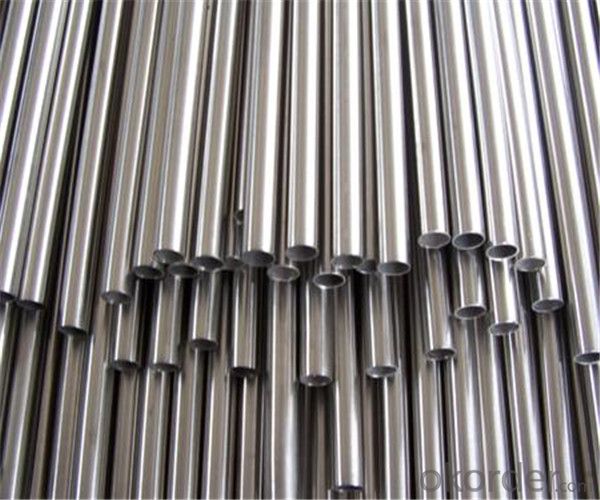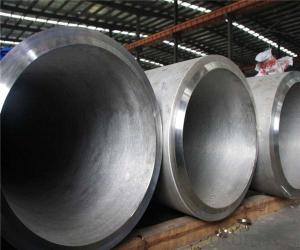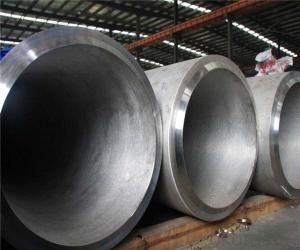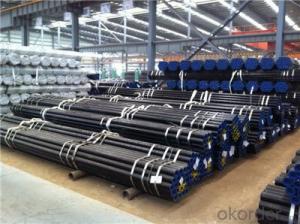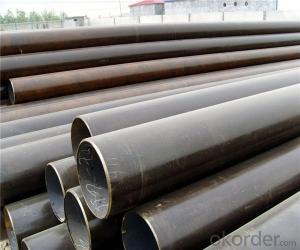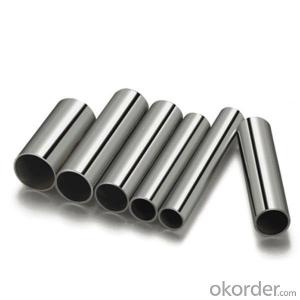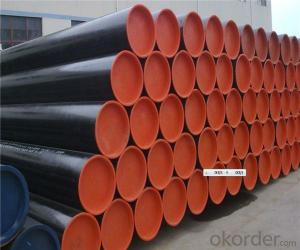High Quality Seamless Steel Pipe from CNBM International Group
- Loading Port:
- Tianjin
- Payment Terms:
- TT OR LC
- Min Order Qty:
- 100 m.t.
- Supply Capability:
- 200000 m.t./month
OKorder Service Pledge
OKorder Financial Service
You Might Also Like
PRODUCT DETAILS
1.Structure of Seamless Steel Pipe Description:
A large amount of Seamless Steel Pipes is offered to the clients at cost effective rates. These pipes are extremely durable, resistant to corrosion and have high tensile strength. Our pipes are used in nuclear plants, power plants, refineries and construction industry across the country. Furthermore, we are capable of providing these seamless pipes to the clients in bulk quantity.
2.Main Features of the Steel Pipe:
• High manufacturing accuracy
• High strength
• Small inertia resistance
• Strong heat dissipation ability
• Good visual effect
•Reasonable price
3.Packaging & Delivery:
| Packaging Details: | Seaworthy packages, bundles wrapped with strong steel strip |
| Delivery Detail: | 15-30 days after received 30% TT |
4.Seamless Steel Pipe Specification:
| Standard: | GB, DIN, ASTM,ASME, ASTM A106-2006, ASTM A53-2007 |
| Grade: | 10#,20#, 45#, 16Mn |
Thickness: | 8 - 33 mm |
| Section Shape: | Round |
| Outer Diameter: | 133 - 219 mm |
| Place of Origin: | Shandong, China (Mainland) |
| Secondary Or Not: | Non-secondary |
| Application: | Hydraulic Pipe |
| Technique: | Cold Drawn |
| Certification: | API |
| Surface Treatment: | factory state or painted black |
| Special Pipe: | API Pipe |
| Alloy Or Not: | Non-alloy |
| Length: | 5-12M |
| Outer Diameter: | 21.3-610mm |
5.FAQ of Seamless steel pipe:
①How is the quality of your products?
Our products are manufactured strictly according to national and internaional standard, and we take a test
on every pipe before delivered out. If you want see our quality certifications and all kinds of testing report, please just ask us for it.
Guaranteed: If products’ quality don’t accord to discription as we give or the promise before you place order, we promise 100% refund.
②How about price?
Yes, we are factory and be able to give you lowest price below market one, and we have a policy that “ for saving time and absolutely honest business attitude, we quote as lowest as possible for any customer, and discount can be given according to quantity”,if you like bargain and factory price is not low enough as you think, just don’t waste your time.Please trust the quotation we would give you, it is professional one.
③Why should you chose us?
Chose happens because of quality, then price, We can give you both.Additionally, we can also offer professional products inquiry, products knowledge train(for agents), smooth goods delivery, exellent customer solution proposals.Our service formula: good quality+good price+good service=customer’s trust.
SGS test is available, customer inspection before shipping is welcome, third party inspection is no problem.
Any question, pls feel free to contact us !
- Q: Can steel pipes be used for underground stormwater drainage?
- Yes, steel pipes can be used for underground stormwater drainage. Steel pipes are commonly used in underground drainage systems due to their durability, strength, and resistance to corrosion. They can effectively manage the flow of stormwater and provide long-lasting solutions for underground drainage needs.
- Q: Who knows what is the difference between double submerged arc welded pipe and longitudinal submerged arc welding?
- Double submerged arc welding should be for spot welding and single side welding, they are straight line welds, but double submerged arc welding seam is more beautiful and fine.
- Q: How are steel pipes used in the construction of offshore oil rigs?
- Steel pipes are used in the construction of offshore oil rigs primarily for the transportation of oil and gas. These pipes are used to connect the wells drilled in the seabed to the surface facilities on the rig. They are also utilized for the circulation of drilling fluids, which help maintain stability and cool down the drilling equipment. Additionally, steel pipes are used to construct the rig's structural components like risers, conductors, and caissons, providing strength and support in the harsh offshore environment.
- Q: What is the maximum length of steel pipes available in the market?
- The maximum length of steel pipes available in the market can vary depending on various factors such as the type of steel, manufacturing capabilities, transportation limitations, and customer requirements. However, in general, steel pipes can be manufactured in lengths of up to 12 meters (40 feet) or even longer. It is important to note that longer lengths may be more challenging to handle and transport, and may require specialized equipment or techniques. Ultimately, the maximum length of steel pipes available in the market will be determined by the specific needs and capabilities of the industry and customers.
- Q: What is the creep resistance of steel pipes?
- The ability of steel pipes to withstand deformation or elongation over time when exposed to high temperatures and constant stress is referred to as their creep resistance. Steel pipes are highly regarded for their exceptional resistance to creep because of the inherent strength and stability of the material. The creep resistance of steel pipes can vary depending on factors like the composition of the alloy, heat treatment, and the conditions in which they are used. Creep is a phenomenon that occurs at elevated temperatures, causing materials to slowly deform under constant stress. In the case of steel pipes, this can be a concern in applications where they are subjected to high temperatures for extended periods, such as in power plants, industrial furnaces, or steam pipelines. The ability to resist creep deformation is crucial to maintain the structural integrity and longevity of the pipes. Steel pipes are often designed and manufactured using alloys with high creep resistance properties, such as chromium-molybdenum (Cr-Mo) steels or nickel-based alloys. These alloys possess excellent mechanical strength, thermal stability, and resistance to oxidation and corrosion, all of which contribute to their superior creep resistance. Moreover, heat treatment processes like quenching and tempering can significantly enhance the creep resistance of steel pipes. These treatments involve controlled heating and cooling cycles to optimize the microstructure of the steel, thereby increasing its resistance to deformation and improving its overall performance at high temperatures. It is important to note that the creep resistance of steel pipes is typically specified by industry standards and codes, such as the American Society of Mechanical Engineers (ASME) Boiler and Pressure Vessel Code. These standards define the allowable stress levels and design criteria for different steel pipe applications, ensuring that they meet the necessary safety and performance standards. In summary, steel pipes are renowned for their excellent creep resistance due to their inherent strength, stability, and ability to withstand high temperatures. The specific creep resistance of steel pipes may vary depending on factors such as alloy composition, heat treatment, and operating conditions. Proper design and adherence to industry standards are essential to ensure the desired creep resistance and overall performance of steel pipes in various applications.
- Q: What is the difference between steel pipes and HDPE pipes?
- Steel pipes and HDPE pipes are both commonly used for various applications, but they differ in their composition and characteristics. Steel pipes are made from a combination of iron and carbon, offering high strength, durability, and resistance to extreme temperatures and pressure. They are commonly used in industries like oil and gas, construction, and plumbing. On the other hand, HDPE pipes are made from high-density polyethylene, a thermoplastic material known for its flexibility, corrosion resistance, and lightweight nature. HDPE pipes are often used in water supply and drainage systems, as well as for underground and aboveground applications. Ultimately, the choice between steel pipes and HDPE pipes depends on the specific requirements of the project, including factors such as cost, application, and environmental conditions.
- Q: What are the different types of steel pipe tees?
- Various plumbing and piping applications commonly utilize different types of steel pipe tees. These tees serve various purposes and offer specific functionalities. 1. Equal tee: This tee consists of three branches of the same size, ensuring an equal flow of fluid or gas through each branch. 2. Unequal tee: As suggested by its name, an unequal tee features branches of varying sizes. This allows for merging or diversion of flows with different volumes or pressures. 3. Reducing tee: This tee is deployed when the branch size is smaller than the main pipe size. It enables a reduction in size while maintaining the flow in the main line. 4. Barred tee: In situations involving the insertion or removal of a pipeline-cleaning and inspection device known as a pig, a barred tee is employed. It possesses a bar welded across one or two branches to create a bypass for the pig. 5. Lateral tee: A lateral tee has a branch angle of either 45 degrees or 90 degrees, facilitating the perpendicular alignment of the branch line with the main line. It finds extensive use in fire sprinkler systems and scenarios necessitating a change in direction. 6. Compression tee: This tee is suitable for gas or hydraulic systems, where branches are connected using compression fittings rather than welding or threading. 7. Butt-weld tee: High-pressure and high-temperature applications employ butt-weld tees. These tees are welded to the main pipe using butt-welding techniques, ensuring a robust and leak-proof connection. These represent some of the most prevalent types of steel pipe tees employed across diverse industries. The selection of the appropriate tee depends on specific project requirements, such as pipe size, flow rates, and transported materials.
- Q: Can steel pipes be used for bridge construction?
- Yes, steel pipes can be used for bridge construction. Steel pipes are often used in the construction of bridges due to their high strength, durability, and ability to withstand heavy loads and harsh weather conditions. They can be used for various components of a bridge, including piers, supports, and even the bridge deck itself. Steel pipes are preferred in bridge construction as they provide excellent structural integrity and can be easily fabricated and installed.
- Q: Can steel pipes be used for water treatment plants?
- Yes, steel pipes can be used for water treatment plants. Steel pipes are widely used in water treatment plants due to their high durability, strength, and resistance to corrosion. They can effectively handle the high pressure and flow requirements of water treatment processes. Additionally, steel pipes can be easily welded and joined, making them suitable for various applications within water treatment plants, such as transporting raw water, treating chemicals, and distributing treated water.
- Q: How are steel pipes used in the construction of oil and gas pipelines?
- Steel pipes are commonly used in the construction of oil and gas pipelines due to their high strength, durability, and resistance to corrosion. These pipes are employed to transport crude oil and natural gas from extraction sites to refineries and distribution centers. They provide a reliable and efficient means of transporting these valuable resources over long distances, ensuring a safe and secure supply of energy. Additionally, steel pipes are capable of withstanding high pressure and extreme temperature conditions, making them suitable for the demanding environment of oil and gas transportation.
Send your message to us
High Quality Seamless Steel Pipe from CNBM International Group
- Loading Port:
- Tianjin
- Payment Terms:
- TT OR LC
- Min Order Qty:
- 100 m.t.
- Supply Capability:
- 200000 m.t./month
OKorder Service Pledge
OKorder Financial Service
Similar products
Hot products
Hot Searches
Related keywords
